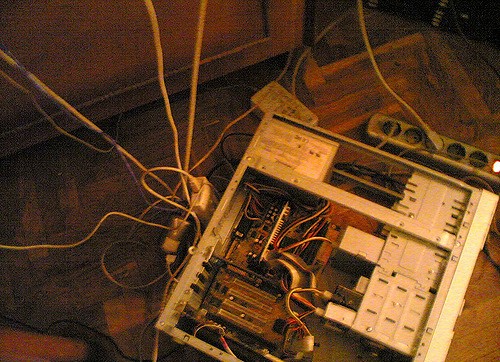Today’s dispatch was contributed by Way Spurr-Chen, a developer who curates the Glitchet newsletter (“weekly futuristic news and glitch aesthetic webzine”), hangs out on Twitter, and has myriad other projects.
We’ve always changed ourselves with some form of magic or another. Incantations, self-hypnosis, drugs. A finely pressed suit and $400 handbag. The dire imaginations of children, actors, pretenders. We wear masks and we play games — we are changers. The cessation of an atom’s vibration is a deep freeze: to stay still is to die. That’s probably why you’re reading this. You can smell which way the wind blows, and “forward” is a funny smell worth paying attention to.
Still, that wind blows fast. I’ve been reading about people controlling robotic limbs with their minds, a surgeon who implanted himself to see if he could digitize his thoughts, companies injecting their employees with RFID chips, and people putting LEDs under their skin. And those are just the biohackers! The internet allows us to get lost in increasingly specific subcultures and ideas. Our connectivity splinters us like lightning as our lives course through endless information. Years don’t feel like years anymore; I feel like I’m being blended into months and I’m counting my days in weeks. I wonder when I’ll know that I’ve been left behind, but that’s the trick: I’m already behind. We all are. You can’t be “on it” anymore — you can only tune into the infinite noise and pick out a signal. Wherever you find people, you’ll find a community thriving and moving faster than you can keep up.
What does that do to our play? We’re learning the power of permanence online while realizing the importance of having anonymous options. As the amount of information we put online increases, encased in silicon boxes, so does our ability to modulate, flex, and bend that signal through the future. (May our audiences be as forgiving of our pasts as we are.) It becomes simultaneously easier to transform yourself and to be pinned to an old version of yourself. Yet we will always shove forward bravely to new identities; we can’t stop.
That’s just the internet. Old news already. Our ability to change ourselves, though, our bodies — that’s fast. When I saw those armless kids with modular LEGO prosthetics they could build on, I wanted one. I bet there will be a point where it’s a reasonable exchange to swap a flesh arm for a robot arm, even if your robot arm’s USB 3.0 extensions will probably be obsolete by 2020. (I hope you got the universal RFC shoulder socket adapter. Sometimes you gotta lose a little more flesh, but that’s just the tradeoff for longevity. Make sure you do your research: you wouldn’t want to buy from a startup that’s hoping to get acquired by Microsoft. Google might be OK.)
Of course, those are just functional, almost decorative. The thing I wonder most is how I would feel, knowing that I’m part machine, or part internet, or different, enhanced. Even if I can control the rate of my own transformation, would I feel pressured by the options available? What about aesthetics? When we can change ourselves so quickly, and we see the degree at which others might change, would we be compelled to enter an arms race (no pun intended) to become the most stylish, the most hip, the most specific? How fast can self-perception change? Does it lead or does it follow the things that we find ourselves becoming?
Certainly, perspective and identity are constantly in flux and the self rarely sees its reflection. But I hope the things I can hold onto are my habits. These give me stability. These define me. Even if I did get a robot arm, or an RFID chip, or a vibrating penis (I wouldn’t — I mean, maybe — no — let me think about it), I would still like whiskey and ginger beers, lasagna, dark clothes, the smell of a bonfire on the beach. I have these things to hold onto, regardless of what else about myself I change. I can take solace in the idea that I still haven’t changed. Not really. I can hold onto the rest of my humanity that is slow and almost static.
But the future always brings us new questions: what happens when you augment that? Your mind? Would you erase your memories? Would you program yourself to like something that the love of your life likes? Does it matter? Identity may not need to seem discrete, concrete. After all, can you step into the same river twice? Maybe you just have to tune into the signal in the noise wherever you find it. Mask-wearers, pretenders, changers that we are — maybe that’s already what we do. We’ll just get faster.
If you like Exolymph, you will definitely like Glitchet, so I recommend that you go sign up!




